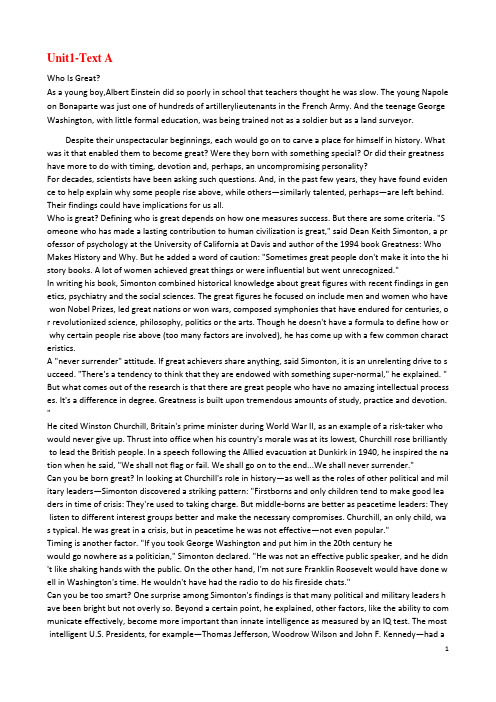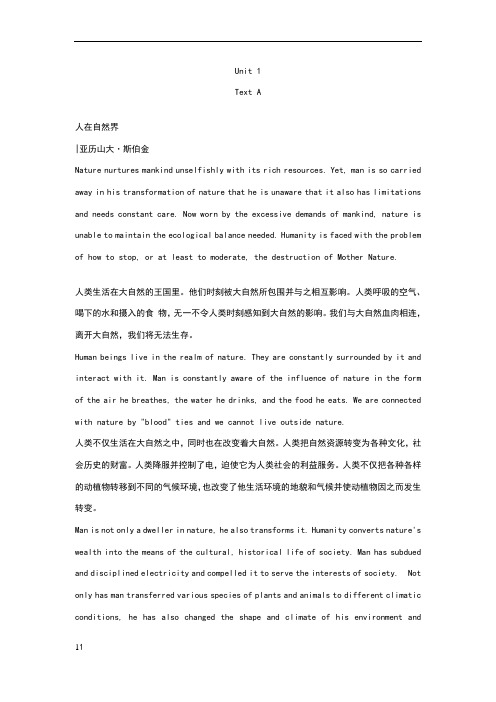21世纪大学英语教程(第四册)Unit1课文原文
21世纪大学英语读写教程4 unit1 课件ppt

Structure
You have a stomachache. It’s not that food was bad, it’s probably that you have too much stress from your work.
Structure
《读写教程 IV》: Ex. VIII, p. 12
Structure
2. Children have different performances at school. It’s not because they have different IQs, but because they are brought up in different environments.
Model:
For most of us, the reason does not lie in the fact that we don’t have the ability, but in the fact we don’t devote the time.
For most of us, it’s not that we don’t have the ability, it’s that we don’t devote the time.
Structure
Rewrite the following sentences, using the sentence pattern It’s not that…, it’s that…
21世纪大学英语第四册课后习题答案

21世纪大学英语读写教程第四册Unit11.Americans tend to define people by the jobs they have/do. Such characteristics as their family and educational backgrounds are considered less important.美国人往往以从事的工作来对人们进行划分。
家庭和教育背景这些特点被认为是不太重要的。
2.His uncompromising personality explains why he could no longer put up with his employer and eventually submitted his resignation.他决不妥协的个性是他再也无法容忍他的雇主,并最终递交了辞职书的原因。
3.His uncompromising personality explains why he could no longer put up with his employer and eventually submitted his resignation.If you really want to learn English well, you must put in a lot of time and energy, or you'll go nowhere. The same can be said of other subjects.如果你真想学好英语,你就必须投入大量的时间和精力,否则你就不会有任何进步。
对于其他课程也可以这么说。
4.Some actors fame is built on their innate beauty, but despite his short stature, Dustin Hoffman rose above and it is his excellent acting that set him apart. 有些演员的名声靠的是他们天生的美貌,但是达斯汀?霍夫曼(Dustin Hoffman) 尽管身材矮小(short stature),还是出类拔萃,而使他与众不同的正是他精湛的演技。
21世纪大学英语第四册课文原文

Unit1-Text AWho Is Great?As a young boy,Albert Einstein did so poorly in school that teachers thought he was slow. The young Napole on Bonaparte was just one of hundreds of artillerylieutenants in the French Army. And the teenage George Washington, with little formal education, was being trained not as a soldier but as a land surveyor.Despite their unspectacular beginnings, each would go on to carve a place for himself in history. What was it that enabled them to become great? Were they born with something special? Or did their greatness have more to do with timing, devotion and, perhaps, an uncompromising personality?For decades, scientists have been asking such questions. And, in the past few years, they have found eviden ce to help explain why some people rise above, while others—similarly talented, perhaps—are left behind. Their findings could have implications for us all.Who is great? Defining who is great depends on how one measures success. But there are some criteria. "S omeone who has made a lasting contribution to human civilization is great," said Dean Keith Simonton, a pr ofessor of psychology at the University of California at Davis and author of the 1994 book Greatness: Who Makes History and Why. But he added a word of caution: "Sometimes great people don't make it into the hi story books. A lot of women achieved great things or were influential but went unrecognized."In writing his book, Simonton combined historical knowledge about great figures with recent findings in gen etics, psychiatry and the social sciences. The great figures he focused on include men and women who have won Nobel Prizes, led great nations or won wars, composed symphonies that have endured for centuries, o r revolutionized science, philosophy, politics or the arts. Though he doesn't have a formula to define how or why certain people rise above (too many factors are involved), he has come up with a few common charact eristics.A "never surrender" attitude. If great achievers share anything, said Simonton, it is an unrelenting drive to s ucceed. "There's a tendency to think that they are endowed with something super-normal," he explained. " But what comes out of the research is that there are great people who have no amazing intellectual process es. It's a difference in degree. Greatness is built upon tremendous amounts of study, practice and devotion. "He cited Winston Churchill, Britain's prime minister during World War II, as an example of a risk-taker who would never give up. Thrust into office when his country's morale was at its lowest, Churchill rose brilliantly to lead the British people. In a speech following the Allied evacuation at Dunkirk in 1940, he inspired the na tion when he said, "We shall not flag or fail. We shall go on to the end...We shall never surrender."Can you be born great? In looking at Churchill's role in history—as well as the roles of other political and mil itary leaders—Simonton discovered a striking pattern: "Firstborns and only children tend to make good lea ders in time of crisis: They're used to taking charge. But middle-borns are better as peacetime leaders: They listen to different interest groups better and make the necessary compromises. Churchill, an only child, wa s typical. He was great in a crisis, but in peacetime he was not effective—not even popular."Timing is another factor. "If you took George Washington and put him in the 20th century hewould go nowhere as a politician," Simonton declared. "He was not an effective public speaker, and he didn 't like shaking hands with the public. On the other hand, I'm not sure Franklin Roosevelt would have done w ell in Washington's time. He wouldn't have had the radio to do his fireside chats."Can you be too smart? One surprise among Simonton's findings is that many political and military leaders h ave been bright but not overly so. Beyond a certain point, he explained, other factors, like the ability to com municate effectively, become more important than innate intelligence as measured by an IQ test. The most intelligent U.S. Presidents, for example—Thomas Jefferson, Woodrow Wilson and John F. Kennedy—had ahard time getting elected, Simonton said, while others with IQs closer to the average (such as Warren G. Ha rding) won by landslides. While political and economic factors also are involved, having a genius IQ is not ne cessary to be a great leader.In the sciences, those with "genius level" IQs do have a better chance at achieving recognition, added Simo nton. Yet evidence also indicates that overcoming traditional ways of thinking may be just as important. He pointed to one recent study where college students were given a set of data and were asked to see if th ey could come up with a mathematical relation. Almost a third did. What they did not know was that they h ad just solved one of the most famous scientific equations in history: the Third Law of Planetary Motion, an equation that Johannes Kepler came up with in 1618.Kepler's genius, Simonton said, was not so much in solving a mathematical challenge. It was in thinking abo ut the numbers in a unique way—applying his mathematical knowledge to his observations of planetary mo tion. It was his boldness that set him apart.Love your work. As a child, Einstein became fascinated with the way magnets are drawn to metal. "He coul dn't stop thinking about this stuff," Simonton pointed out. "He became obsessed with problems in physics b y the time he was 16, and he never stopped working on them. It's not surprising that he made major contri butions by the time he was 26.""For most of us, it's not that we don't have the ability," Simonton added, "it's that we don't devote the time . You have to put in the effort and put up with all the frustrations and obstacles."Like other creative geniuses, Einstein was not motivated by a desire for fame, said Simonton. Instead, his o bsession with his work was what set him apart.Where such drive comes from remains a mystery. But it is found in nearly all creative geniuses—whether or not their genius is acknowledged by contemporaries."Emily Dickinson was not recognized for her poetry until after her death," said Simonton. "But she was not writing for fame. The same can be said of James Joyce, who didn't spend a lot of time worrying about how many people would read Finnegans Wake."Today, researchers have evidence that an intrinsic passion for one's work is a key to rising above. In a 1985 study at Brandeis University conducted by Teresa Amabile, now a professor of business administration at H arvard University, a group of professional writers—none famous—were asked to write a short poem. Each writer was then randomly placed in one of three groups: One group was asked to keep in mind the idea of writing for money; another was told to think about writing just for pleasure; and a third group was given no instruction at all.The poems then were submitted anonymously to a panel of professional writers for evaluation. The poetry written by people who thought about writing for money ranked lowest. Those who thought about writing j ust for pleasure did the best. "Motivation that comes from enjoying the work makes a significant difference, "Amabile said. (1 214 words)Unit2-Text AThe Gratitude We NeedOn a fine afternoon in New York, I got into a taxi. From the driver's expression and the way he slammed in his gears, I could tell that he was upset. I asked him what was the trouble. "I've got good reason to be sor e," he growled. "One of my fares left a wallet in my cab this morning. Nearly three hundred bucks in it. I spe nt more than an hour trying to trace the guy. Finally I found him at his hotel. He took the wallet without a w ord and glared at me as though I'd meant to steal it.""He didn't give you a reward?" I exclaimed."Not a cent. But it wasn't the dough I wanted..." he fumbled, then exploded, "If the guy had only said so mething..."Because his helpful, honest act had not been appreciated, that cabdriver's day was poisoned, and I kne w he would think twice before rendering a similar service. The need for gratitude is something we all feel, a nd denial of it can do much to harm the spirit of kindness and cooperation.During World War II a mother in Cincinnati received a letter from her son in the army in which he spoke of a woman in a village in Normandy who had taken him into her home when he was wounded and hungry, and hidden him from the Germans. Later on, unhappily, the boy was killed in the Ardennes offensive. Yet th e mother was moved by an irresistible intention. She saved up for two years, crossed the Atlantic and locat ed the village referred to by her son. After many inquiries, she found the woman who had sheltered her son —the wife of an impoverished farmer—and pressed a package into her hand. It was the gold wristwatch he r son had received on his graduation, the only object of real value the boy had ever possessed. The mother' s act of gratitude so touched people's hearts that it has become something of a legend in and around the vil lage. It has done more than fine speeches to foster good feeling toward Americans.Gratitude is the art of receiving gracefully, of showing appreciation for every kindness, great and small. Most of us do not fail to show our pleasure when we receive hospitality, gifts and obvious benefits, but eve n here we can perfect our manner of showing gratitude by making it as personal and sincere as possible. Re cently, when touring in southern Italy with my wife, I sent to a friend in Connecticut several bottles of a loca l wine which had taken our fancy. It was a trifling gift, yet to our surprise, instead of the conventional letter of thanks, we receive a phonograph record. When we played it, we heard our friend's voice speaking after d inner, describing how he and his guests had enjoyed the wine and thanking us for our thoughtfulness. It wa s pleasant to have this unusual proof that our gift had been appreciated.Gratitude is sometimes more than a personal affair. My son, studying medicine at McGill University, tol d me of a patient brought into hospital in Montreal whose life was saved by a blood transfusion. When he was well again he asked: "Isn't there any way I can discover the name of the donor and thank him?" He was told that names of donors are never revealed. A few weeks after his discharge he came back to give a pint of his own blood. Since then he has returned again and again for the same purpose. When a surgeon comm ented on this splendid record of anonymous service, he answered simply: "Someone I never knew did it for me. I'm just saying 'thanks'".It is a comforting thought that gratitude can be not merely a passing sentiment but a renewal which ca n, in some instances, persist for a lifetime. A husband who recalls appreciatively some generous or unselfish act on his wife's part, or a wife who never forgets the gifts her husband has given her, does much to keep t he domestic wheels spinning smoothly. W.H. Hudson, British author and naturalist, has written: "One eveni ng I brought home a friend to share our usual evening meal. Afterward he said to me:‘You are fortunate to have a wife who, despite ill health and children to look after, cooks such excellent meals.' That tribute open ed my eyes and taught me to show gratitude for my wife's day-to-day heroism, which I had hitherto taken f or granted."It is, above all, in the little things that the grace of gratitude should be most employed. The boy who deli vers our paper, the milkman, the mailman, the barber, the waitress at a restaurant, the elevator operator—all oblige us in one way or another. By showing our gratitude we make routine relationships human and ren der monotonous tasks more agreeable.A patient of mine in London who worked as a bus conductor once confided to me, "I get fed up with my job sometimes. People grumble, bother you, haven't got the right change for their tickets. But there's one l ady on my bus morning and evening, and she always thanks me in a particularly friendly way when I take he r ticket. I like to think she's speaking for all the passengers. It helps me to keep smiling."Arnold Bennett had a publisher who boasted about the extraordinary efficiency of his secretary. One da y Bennett said to her, "Your employer claims that you are extremely efficient. What is your secret?" "It's no t my secret," the secretary replied. "It's his." Each time she performed a service, no matter how small, he n ever failed to acknowledge it. Because of that she took infinite pains with her work. Some persons refrain f rom expressing their gratitude because they feel it will not be welcome. A patient of mine, a few weeks afte r his discharge from the hospital, came back to thank his nurse. "I didn't come back sooner," he explained, " because I imagined you must be bored to death with people thanking you." "On the contrary," she replied, "I am delighted you came. Few realize how much we need encouragement and how much we are helped by those who give it." Gratitude is something of which none of us can give too much. For on the smiles, the th anks we give, our little gestures of appreciation, our neighbors build up their philosophy of life.Unit3-Text AHow to Change Your Point of ViewDr. Edward Jenner was busy trying to solve the problem of smallpox. After studying case after case, he s till found no possible cure. He had reached an impasse in his thinking. At this point, he changed his tactics. I nstead of focusing on people who had smallpox, he switched his attention to people who did not have smal lpox. It turned out that dairymaids apparently never got the disease. From the discovery that harmless cow pox gave protection against deadly smallpox came vaccination and the end of smallpox as a scourge in the western world.We often reach an impasse in our thinking. We are looking at a problem and trying to solve it and it see ms there is a dead end. It is on these occasions that we become tense, we feel pressured, overwhelmed, in a state of stress. We struggle vainly, fighting to solve the problem.Dr. Jenner, however, did something about this situation. He stopped fighting the problem and simply ch anged his point of view—from his patients to dairy maids. Picture the process going something like this: Su ppose the brain is a computer. This computer has absorbed into its memory bank all your history, your expe riences, your training, your information received through life; and it is programmed according to all this dat a. To change your point of view, you must reprogramme your computer, thus freeing yourself to take in ne w ideas and develop new ways of looking at things. Dr. Jenner, in effect, by reprogramming his computer, e rased the old way of looking at his smallpox problem and was free to receive new alternatives.That's all very well, you may say, but how do we actually do that?Doctor and philosopher Edward de Bono has come up with a technique for changing our point of view, and he calls it Lateral Thinking.The normal Western approach to a problem is to fight it. The saying, "When the going gets tough, the t ough get going," is typical of this aggressive attitude toward problem-solving. No matter what the problem i s, or the techniques available for solving it, the framework produced by our Western way of thinking is fight . Dr. de Bono calls this vertical thinking; the traditional, sequential, Aristotelian thinking of logic, moving fir mly from one step to the next, like toy blocks being built one on top of the other. The flaw is, of course, tha t if at any point one of the steps is not reached, or one of the toy blocks is incorrectly placed, then the whol e structure collapses. Impasse is reached, and frustration, tension, feelings of fight take over.Lateral thinking, Dr. de Bono says, is a new technique of thinking about things—a technique that avoids this fight altogether, and solves the problem in an entirely unexpected fashion.In one of Sherlock Holmes's cases, his assistant, Dr. Watson, pointed out that a certain dog was of no i mportance to the case because it did not appear to have done anything. Sherlock Holmes took the opposite point of view and maintained that the fact the dog had done nothing was of the utmost significance, for it s hould have been expected to do something, and on this basic he solved the case. Lateral thinking sounds si mple. And it is. Once you have solved a problem laterally, you wonder how you could ever have been hung up on it. The key is making that vital shift in emphasis, that sidestepping of the problem, instead of attackin g it head-on.Dr. A. A. Bridger, psychiatrist at Columbia University and in private practice in New York, explains how la teral thinking works with his patients. "Many people come to me wanting to stop smoking, for instance," he says. "Most people fail when they are trying to stop smoking because they wind up telling themselves, 'No, I will not smoke; no, 1 shall not smoke; no, I will not; no, I cannot...' It's a fight and what happens is you en d up smoking more.""So instead of looking at the problem from the old ways of no, and fighting it, I show them a whole new point of view—that you are your body's keeper, and your body is something through which you experience life. If you stop to think about it, there's really something helpless about your body. It can do nothing for its elf. It has no choice, it is like a baby's body. You begin then a whole new way of looking at it—‘I am now goi ng to take care of myself, and give myself some respect and protection, by not smoking.' “There is a Japanese parable about a donkey tied to a pole by a rope. The rope rubs tight against his ne ck. The more the donkey fights and pulls on the rope, the tighter and tighter it gets around his throat—until he winds up dead. On the other hand, as soon as he stops fighting, he finds that the rope gets slack, he can walk around, maybe find some grass to eat...That's the same principle: The more you fight something the m ore anxious you become—the more you're involved in a bad pattern, the more difficult it is to escape pain."Lateral thinking," Dr. Bridger goes on, "is simply approaching a problem with what I would call an Easte rn flanking maneuver. You know, when a zen archer wants to hit the target with a bow and arrow, he doesn 't concentrate on the target, he concentrates rather on what he has in his hands, so when he lets the arrow go, his focus is on the arrow, rather than the target. This is what an Eastern flanking maneuver implies—ins tead of approaching the target directly, you approach it from a sideways point of view—or laterally instead of vertically.""I think the answer lies in that direction," affirms Dr. Bridger. "Take the situation where someone is in a crisis. The Chinese word for crisis is divided into two characters, one meaning danger and the other meanin g opportunity. We in the Western world focus only upon the ‘danger' aspect of crisis. Crisis in Western civili zation has come to mean danger, period. And yet the word can also mean opportunity. Let us now suggest t o the person in crisis that he cease concentrating so upon the dangers involved and the difficulties, and con centrate instead upon the opportunity—for there is always opportunity in crisis. Looking at a crisis from an opportunity point of view is a lateral thought."Unit4-Text AHow to Become GiftedIn a study of educational techniques, a teacher was told r that her newclass were all gifted children. "Y ou should get above-average results from them," she was advised, and by the end of the term she was getti ng just that, better than average work.The remarkable thing about it all was that in reality the class was not unusual. They were just an averag e group of students with IQs within the normal range. The teacher had been deceived about their potential.This study uncovered many answers to many questions about teaching and children, but it left even more questions unanswered. One point it did make with unusual clarity is that a child will usually live up to a te acher's expectations when the child believes those expectations are honest.An unanswered question was: In what way did the teacher communicate to the students that they were special and could do superior work? She didn't tell them that in so many words, but obviously something a bout her attitude convinced the students that they were gifted.Further studies showed that the special "something" in the teacher's attitude was, in part, the type of work she gave the class, and in part how she presented it. But the strongest "something" was the teacher h erself and her attitude toward the class and toward their ability.There was an extra amount of confidence and interest in her voice that said, "You're bright children." T here was a constant reassuring tone that told them they would do well, very well. The children picked up th ese signals and reacted positively to them.When a student's work did not measure up to the teacher's expectations, as often happened, the student was not treated with disappointment, anger, or annoyance. Instead, the teacher assumed that this was an exception, an accident, a bad day, a momentary slip —and the student believed her and felt reassured. The next time around, he tried harder, determined to live up to what the teacher knew he could do.The exact part of communication that tells a child, "I expect the best," is difficult to pinpoint. In part it consists of a level tone showing assurance, a lack of verbal impatience, an absence of negative qualities such as irony, put-downs, and irritation. The teacher who expects the best asks her questions with conviction, knowing the answers she gets will be right, and the child picks up that conviction.Most of this is transmitted through the voice, but a surprising amount is in the attitude, in touch, and in facial expression.An experiment similar to the one done with "gifted" children was done with "gifted" mice. A scientist was given a group of ordinary mice, but told that they were a special breed, trained to run a maze in record time. Working with these mice, the scientist found that they did learn faster than other mice and did run the maze more quickly.But mice know nothing of our language. How was the scientist able to communicate his expectations to them? An examination of all the variables in the test concluded that the unusually good results were due to the way he had handled the mice, the way he talked to them and the tone, the confidence, the reassurance, and the certainty in his voice. They absorbed all the messages and performed accordingly!In a broader view of both these experiments, the teacher and the scientist used a principle common to all societies at all levels — the principle of labeling. All our expectations are prejudiced, and we have very different expectations for different people, even on a national level. We think of people in terms of national characteristics. We expect Americans to be greedy, after the big buck, and we label them that way in our minds. We label Germans neat and orderly, English cold, distant, and reserved, Italians emotional, Japanese polite——and so it goes. We pin a very narrow label on a very broad, far from homogeneous group. We do it on racial levels too. Blacks are musical, Indians are stoic, Orientals inscrutable. We even label the sexes —men are aggressive, women passive.On a family basis, the labels are sometimes attached by the neighbors. "Those Joneses are trash...alway s on welfare." Or the label may be attached by the family itself. "We Smiths would rather go hungry than as k for government help" The Smith boy, growing up with this label of awesome independence, lives up to it as readily as the Jones girl lives up to her label. "They all think we're trash? I'll act like trash!" The label may be less inclusive, even sexist. One family might say proudly, "The men in our family are always professionals." When Bill, a son in this family finds that carpentry is the work he loves best, he faces a family conflict — and a conflict with himself. His inner strength may allow him to go through with his own desires and become a carpenter, but then he knows that he hasn't lived up to the family label and he goes through life with a sense of guilt. He may even create his own label. "I'm a failure, really." It doesn't matter that Bill is a success in his field, that in time he owns his own business and makes more money than his brot her Bob, who became a lawyer. Bill is still not a professional man, and as a result his inner label still reads fa ilure.Labeling within a family starts very early. Before the baby understands verbal language, he responds to body language and indirect communication. He senses the love in his parents' voice before he understands the words, and he also senses the rejection, indifference, fear, or hostility, and he reacts to those emotions too.If he's treated with love and gentleness, he responds with both emotions. Later, when he understands speech, he accepts his label. Jimmy is the nice one in the family, or Sally, who's been a difficult baby, earns t he label of troublemaker. Each child, along with his given name, picks up a label. She's the clever one. He's t he pushy one. Norman is always late. Betty is so hard to love. Barbara is cold. Jack is wild. Natalie is sweet, and so on. The labels may reflect reality. Natalie may be sweet, but as often as not the reality has been imp osed on the child by the label. If Natalie hears that she is sweet often enough, she begins to act sweet. You tend to live up to your label.In the same way, the students in the teaching experiment were labeled bright, and they managed to be bright, to work beyond their ordinary ability.Unit5-Text APrison StudiesMany who today hear me somewhere in person, or on television, or those who read something I've sai d, will think I went to school far beyond the eighth grade. This impression is due entirely to my prison studi esIt had really begun back in the Charlestown Prison, when Bimbi first made me feel envy of his stock of k nowledge. Bimbi had always taken charge of any conversation he was in, and I had tried to emulate him. Bu t every book I picked up had few sentences which didn't contain anywhere from one to nearly all of the wor ds that might as well have been in Chinese. When I just skipped those words, of course, I really ended up wi th little idea of what the book said. So I had come to the Norfolk Prison Colony still going through only book -reading motions. Pretty soon, I would have quit even these motions, unless I had received the motivation t hat I did.I saw that the best thing I could do was get hold of a dictionary—to study, to learn some words. I was lu cky enough to reason also that I should try to improve my penmanship. It was sad. I couldn't even write in a straight line. It was both ideas together that moved me to request a dictionary along with some tablets and pencils from the Norfolk Prison Colony school.I spent two days just thumbing uncertainly through the dictionary's pages. I've never realized so many words existed! I didn't know which words I needed to learn. Finally, to start some kind of action, I began co pying.。
新21世纪大学英语综合教程4 Unit1译文 Harsh Reality of the American Dream 美国梦的严酷现实

美国梦的严酷现实汉弗莱·霍克斯利这是西雅图海边阳光明媚、赤日炎炎的一天,穿越海湾能一眼望见远处的岛屿,其自然美景没有受到任何破坏。
人们躺在一片草坪上看书或和恋人相依,一阵充满活力的无伴奏的歌声从草坪的另一端传了过来。
原来是一家咖啡馆外面有4位男子正在唱着一首关于丘比特的情歌,每个人都有着不同的音域。
围了几圈的人群正摇摆着身体合着节奏拍手。
这家咖啡馆的星巴克徽标让我觉得有一点过时,直到有人提到这是世界上第一家开张的星巴克时我才恍然大悟。
我是因为最近的一次调查来到西雅图的。
这项调查是由位于伦敦的经济运转情况中心发起的,旨在了解在世界不同的地方发财致富究竟有多么容易或多么困难——如果不是发财致富,至少也是摆脱贫困。
“如果你生在美国的一个穷人家庭,”其中的一位作者说,“那么比起在欧洲、北欧国家,你更有可能终身贫困,就连在加拿大,一个你觉得和美国差不多的国家,那里的情况也要比美国好。
”机会这项研究连同伊拉克战争以来愈来愈普遍的反美情绪,让我想到了一个有关美国梦——认为在美国任何事情都有可能实现的想法——的问题。
我之所以选择西雅图不仅仅是因为星巴克诞生在那里,还因为微软、亚马逊图书以及波音飞机都来自这座小城市。
如果你愿意将它们称作梦想的话,那么这些小梦想现在已经变成了全球的大品牌。
“天气真不错,是吗?”我转过身来,看到一张布满皱纹、略显疲惫的男人的脸,我称呼他“戴夫”。
“你会得到你想要的吗?”我们几天前见过面,当时他正在一家帮助穷人和无家可归者的慈善机构里吃早饭,我曾问他是否相信美国梦。
“美国梦,”戴夫吃着松饼,用餐巾纸擦了擦嘴说道,“这个嘛,它时来时去。
它还会再来的。
”成功者和失败者在一家天花板很低的餐厅里,有一百来个男人沿着搁板桌并排而坐。
他们5点就开始排队登记了,因为说不定会有工作。
然后他们吃饭,而保安则在一边监视他们,以防有什么麻烦发生。
在欧洲或仅仅是边界那一边的加拿大,人们更有可能获得社会保障。
新世纪大学英语综合教程4unit1课文逐段翻译

Unit 1Text A人在自然界|亚历山大·斯伯金Nature nurtures mankind unselfishly with its rich resources. Yet, man is so carried away in his transformation of nature that he is unaware that it also has limitations and needs constant care. Now worn by the excessive demands of mankind, nature is unable to maintain the ecological balance needed. Humanity is faced with the problem of how to stop, or at least to moderate, the destruction of Mother Nature.人类生活在大自然的王国里。
他们时刻被大自然所包围并与之相互影响。
人类呼吸的空气、喝下的水和摄入的食物,无一不令人类时刻感知到大自然的影响。
我们与大自然血肉相连,离开大自然,我们将无法生存。
Human beings live in the realm of nature. They are constantly surrounded by it and interact with it. Man is constantly aware of the influence of nature in the form of the air he breathes, the water he drinks, and the food he eats. We are connected with nature by "blood" ties and we cannot live outside nature.人类不仅生活在大自然之中,同时也在改变着大自然。
21世纪大学英语视听说教程4unit1

Part A Listening
Unit 1 Do It Yourself
3. A) Because it takes him 20 minutes to repair it. B) Because they have money to spend on a new vacuum cleaner. C) Because every few weeks the vacuum cleaner breaks down. D) Because every few months the vacuum cleaner breaks down.
Word Tips
1. A) To use the space in the corner of the backyard. B) To store the garden tools and lawn mower. C) To use a simple construction plan. D) To help Ashley with her gardening.
兰斯顿 · 休斯(1902年2月1日—1967年5月22日):美国诗人、社 会活动家、小说家、剧作家、专栏作家。其诗歌描述美国黑人劳动人 民充满艰辛、快乐、欢笑与音乐的生活。
Part A Listening
Unit 1 Do It Yourself
shovel n. rake n. faucet n. handyman n.
intonation and stress of the words.
Dreams
By Langston Hughes
译
梦想
兰斯顿 · 休斯
Hold fast to dreams For if dreams die Life is a broken-winged bird That can never fly.
21世纪大学英语综合教程4Unit1-B

Unit 1: Warm up
Directions: You will hear a passage and you are required to fill in the blanks with the exact words you have just heard.
M: The bathroom looks lovely. Did you redecorate it yourself or did you 1. _____________ to do it for you?
M: So, let’s see. You have put new tiles on the floor and 3. _______ a few tiles on the walls. You’ve also 4. _____ a small cupboard for toiletries. The bath, shower and washbasin are the same as before,
information I got from the Internet. Doing the flooy — from early morning right through to the evening. Then I spent a few hours replacing the 6. ______ wall tiles. Putting the cupboard up took about an hour, so it took me two days 7. ________. M: I think you’ve done a very good job. At least as good as a 8.
21世纪大学英语综合教程4Unit1A

1. Turn the wrap to the shorter session and paste it around your body;
2. Tie a double knot securely over the middle of your chest;
3. Grab the bottom ends of the wrap and bring them up over your shoulders, secure it with another double knot;
Directions: Put the words / expressions in the box into the correct categories.
money-saving unconfident satisfy
plaster
tile valuable
TV programs funny
renovate
Tapeline Saw
Electro drill Sandpaper Tweezers
10 DIY Tools
Hammer Screwdriver Scissors Pliers Wrench
Unit 1: Theme-relsy Drape Cardigan 时髦褶皱开衫
Stir occasionally. Let the starter yogurt sit at room temperature while you are waiting for the milk to cool. This will prevent it from being too cold when you add it in.
specialist magazines
- 1、下载文档前请自行甄别文档内容的完整性,平台不提供额外的编辑、内容补充、找答案等附加服务。
- 2、"仅部分预览"的文档,不可在线预览部分如存在完整性等问题,可反馈申请退款(可完整预览的文档不适用该条件!)。
- 3、如文档侵犯您的权益,请联系客服反馈,我们会尽快为您处理(人工客服工作时间:9:00-18:30)。
21世纪大学英语读写教程(第四册)Unit1课文原文《Who Is Great?》Michal Ryan As a young boy, Albert Einstein did so poorly in school that teachers thought he was slow. The young Napoleon Bonaparte was just one of hundreds of artillery lieutenants in the French Army. And the teenage George Washington, with little formal education, was being trained not as a soldier but as a land surveyor.Despite their unspectacular beginnings, each would go on to carve a place for himself in history. What was it that enabled them to become great? Were they born with something special? Or did their greatness have more to do with timing, devotion and, perhaps, an uncompromising personality?For decades, scientists have been asking such questions. And, in the past few years, they have found evidence to help explain why some people rise above, while others—similarly talented, perhaps—are left behind. Their findings could have implications for us all.Who is great? Defining who is great depends on how one measures success. But there are some criteria. "Someone who has made a lasting contribution to human civilization is great," said Dean Keith Simonton, a professor of psychology at the University of California at Davis and author of the 1994 book Greatness: Who Makes History and Why. But he added a word of caution: "Sometimes great people don't make it into the history books. A lot of women achieved great things or were influential but went unrecognized."In writing his book, Simonton combined historical knowledge about great figures with recent findings in genetics, psychiatry and the social sciences. The great figures he focused on include men and women who have won Nobel Prizes, led great nations or won wars, composed symphonies that have endured for centuries, or revolutionized science, philosophy, politics or the arts. Though he doesn't have a formula to define how or why certain people rise above (too many factors are involved), he has come up with a few common characteristics.A "never surrender" attitude. If great achievers share anything, said Simonton, it is an unrelenting drive to succeed. "There's a tendency to think that they are endowed with something super-normal," he explained. "But what comes out of the research is that there are great people who have no amazing intellectual processes. It's a difference in degree. Greatness is built upon tremendous amounts of study, practice and devotion."He cited Winston Churchill, Britain's prime minister during World War II, as an example of a risk-taker who would never give up. Thrust into office when his country's morale was at its lowest, Churchill rose brilliantly to lead the British people. In a speech following the Allied evacuation at Dunkirk in 1940, he inspired the nation when he said, "We shall not flag or fail. We shall go on to the end...We shall never surrender."Can you be born great? In looking at Churchill's role in history—as well as the roles of other political and military leaders—Simonton discovered a striking pattern: "Firstborns and only children tend to make good leaders in time of crisis: They're used to taking charge. But middle-borns are better as peacetime leaders: They listen to different interest groups better and make the necessary compromises. Churchill, an only child, was typical. He was great in a crisis, but in peacetime he was not effective—not even popular."Timing is another factor. "If you took George Washington and put him in the 20th century he would go nowhere as a politician," Simonton declared. "He was not an effective public speaker, and he didn't like shaking hands with the public. On the other hand, I'm not sure Franklin Roosevelt would have done well in Washington's time. He wouldn't have had the radio to do his fireside chats."Can you be too smart? One surprise among Simonton's findings is that many political and military leaders have been bright but not overly so. Beyond a certain point, he explained, other factors, like the ability to communicate effectively, become more important than innate intelligence as measured by an IQ test. The most intelligent U.S. Presidents, for example—Thomas Jefferson, Woodrow Wilson and John F. Kennedy—had a hard time getting elected, Simonton said, while others with IQs closer to the average (such as Warren G. Harding) won by landslides. While political and economic factors also are involved, having a genius IQ is not necessary to be a great leader.In the sciences, those with "genius level" IQs do have a better chance at achieving recognition, added Simonton. Yet evidence also indicates that overcoming traditional ways of thinking may be just as important.He pointed to one recent study where college students were given a set of data and were asked to see if they could come up with a mathematical relation. Almost a third did. What they did not know was that they had just solved one of the most famous scientific equations in history: the Third Law of Planetary Motion, an equation that Johannes Kepler came up with in 1618.Kepler's genius, Simonton said, was not so much in solving a mathematical challenge. It was in thinking about the numbers in a unique way—applying his mathematical knowledge to his observations of planetary motion. It was his boldness that set him apart.Love your work. As a child, Einstein became fascinated with the way magnets are drawn to metal. "He couldn't stop thinking about this stuff," Simonton pointed out. "He became obsessed with problems in physics by the time he was 16, and he never stopped working on them. It's not surprising that he made major contributions by the time he was 26.""For most of us, it's not that we don't have the ability," Simonton added, "it's that we don't devote the time. You have to put in the effort and put up with all the frustrations and obstacles."Like other creative geniuses, Einstein was not motivated by a desire for fame, said Simonton. Instead, his obsession with his work was what set him apart.Where such drive comes from remains a mystery. But it is found in nearly allcreative geniuses—whether or not their genius is acknowledged by contemporaries."Emily Dickinson was not recognized for her poetry until after her death," said Simonton. "But she was not writing for fame. The same can be said of James Joyce, who didn't spend a lot of time worrying about how many people would read Finnegans Wake."Today, researchers have evidence that an intrinsic passion for one's work is a key to rising above. In a 1985 study at Brandeis University conducted by Teresa Amabile, now a professor of business administration at Harvard University, a group of professional writers—none famous—were asked to write a short poem. Each writer was then randomly placed in one of three groups: One group was asked to keep in mind the idea of writing for money; another was told to think about writing just for pleasure; and a third group was given no instruction at all.The poems then were submitted anonymously to a panel of professional writers for evaluation. The poetry written by people who thought about writing for money ranked lowest. Those who thought about writing just for pleasure did the best. "Motivation that comes from enjoying the work makes a significant difference, "Amabile said.。
